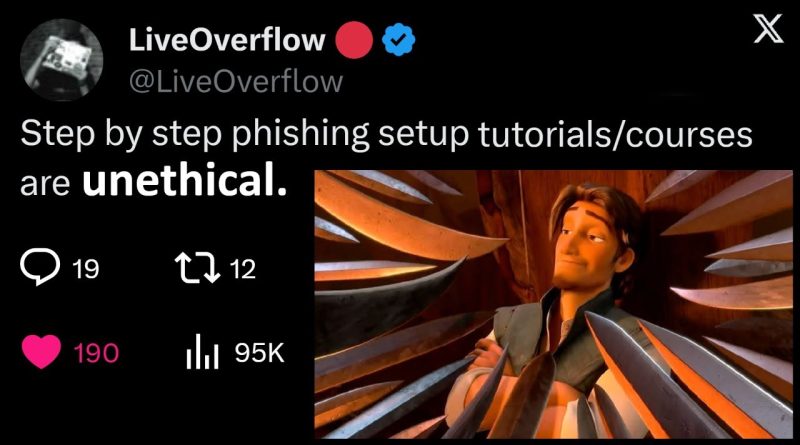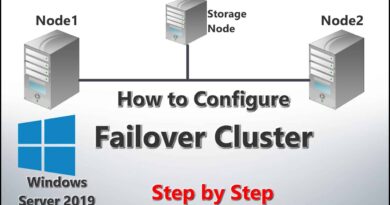Ethical Hacking: What is "Ethical?"
LiveOverflow and I chat about the “ethics” of ethical hacking: with all your community inputs: https://docs.google.com/forms/d/e/1FAIpQLSccMNI7fXFSMboR2Qt-e_voWi-RA9F4WgSKoITlrrIlU8W8wQ/viewform
by John Hammond
linux smtp server




Just let Hammond do his thing
The more I watch this the more I start having negative sentiments towards Overflow
35:55
I feel personally attacked : )
16year olds are more clever than you think ; )
33:00
you just gave those kids another good idea about how to do phishing in a better way xD
Information can't be contained, Overflow. Just like the truth it always comes out. Whether you conceal it / make it hard for people to find. People will always find a way to learn.
"Gun safety is unethical"
personally i hate the term "ethical hacking", in fact i'd rather not try to make the term good. there, i said it. Hacking should stay tied to malicious intents. The good things are called e.g. pentesting. It's confuses people as fuck to say you're hacking stuff for a living and then elaborating you're not breaking the law. If i said i hacked someone then I did actually hack them, without their permission. But most people in the comments are right. There's either no such thing or it doesn't matter. As for the tools – a knife can be used for a murder or making toasts, you get the idea. And even if you have all the damage-doing tools at your disposal, chances of using them maliciously aren't as high as you may think. Just look at it from a different perspective. Chances are they either are script kiddies with no knowledge of how stuff operates or if they aren't and want to use them that way, they need a very good opsec, and most people simply aren't capable of it. Most will get caught, the majority of these courses don't even mention opsec at all. But i say let them try. I don't worry about my security because some "hacking" course was released to the public, the students are still far from the point where they can be dangerous to anyone even after finishing OSCP.
lmao knew yall were gonna make a video…..yea the topic is actually simple af….knowledge is knowledge…tools are tools….people are people lol…i see some bent out of shape saying yada yada you shouldn't put out step by step tutorials….its each persons responsibility to use ANY knowledge they come across responsibly not just hacking..and /or accept the consequences….knowledge is to be shared freely
We have no control over how someone will use any knowledge we share, but a crucial step before learning to read decompiled malware is writing your own basic programs and observing how high level languages get compiled into Assembly instructions.
I tend to think about cyber security the same way I do firearm training. Why would you want important information to remain proprietary when having an open dialogue can bring new insight into a given problem and help answer the communities questions?
A sword isnt good or bad by itself, its just a tool. Whqt decides it is how its used….
Also criminals shouldnt get any sort of privacy, as soon as the court sentences then their name image and crime should be a publicly available and searchable…..
The problem here are the consumers. Not the product in it self. It maybe would be best to hide the product as a part of a course that is not freely available like on youtube. This way the consumers would be less likely to be a random script kiddie just beeing bored.
Oh guys, it's a philosophy problem here 😅
The answer in my opinion is that the expression "ethical hacking" isn't the right one. Ethics is a very large concept and has been discussed among philosophers for ages.
In normative ethics (the attempt of establishing framework of conducts, the one that applies here. In opposition to metaethics – metaphysics of ethics, inquiring the nature of ethics – and applied ethics, the practical application of ethical principles to specific situations or issues, like abortion or capital punishment) there are several ways of thinking. The main ones are Utilitarianism, Deontology, and Virtue.
Utilitarianism focuses on consequences. The principle of utility states ”actions should produce the greatest happiness or pleasure for the greatest number of people".
Deontological ethics, emphasize on the nature of actions rather than consequences. It posits a radical concept that certain actions, regardless of the outcome, are inherently right or wrong. Immanuel Kant as famously said on the subject "Act only according to that maxim whereby you can at the same time will that it should become a universal law". Meaning that you should ask yourself about the rule of conduct you are going to apply to your specific action answer must be consistent with a "univeral law" in a similar situation. The idea of "duty" plays a central role in Kant's deontology and in this previous formulation.
Virtue ethics, as old as Aristotle, focuses more on "personal development". It argues that ethic is about cultivating a good character with qualities such as courage, honesty and compassion rather than following rules or maximizing outcome.
There are also other branches in normative ethics like Contractualism, focusing on social contract and principles that peoples would agree on in a "just society", or Principlism that involves the use of fundamental ethics (autonomy, beneficence, non-maleficence, justice) but is more in the realm of Applied Ethics.
So, for the concept of "Ethical Hacking" the fittest imho is probably Deontology. First, the inherent righness of actions, posing that ethical hackers actions must follow standards and principles "for good". Second, adherence to rules and duties, stating that a practitioner should adhere a "code of conduct" and follow the guidelines whether for reporting vulnerabilities, respecting privacy, and more generally act within legal and ethical boundaries. And last the fundamental emphasis on intentions, which is key to deontology, as ethical hackers are aiming to improve security and protect systems with "good intentions". All these provides a good framework for ethics in hacking that's why I officially propos that we replace the poorly borned "ethical hacke" with the much more explicit "Deontological Hacker"! (mic drop) 😅😅😅
1337
@Bastel Wastel
"John's less educational these days and went the entertainment path..with clickbaity thumbnails and ads. I've subscribed to to this channel in better days" agreed alot of them as gone that way
IMHO There's a lot of false reasoning in this video. Knowledge sharing is different than giving bored teens a step-by-step guide on how to steal people's personal information. You don't give a baby a knife. You don't give a kid a gun. You should only give things to people that can handle it responsibly.
John Hammond is inviting Nazis on his show. 😂
I have a interesting question for you please answer : what if i take a virus code or payload for reverse shell i know it can be defected my Antivirus but what if i creat 2 programs first take a second file input and replace a set of character with in a code " Like switching a letters inside code to another letters in a way not a single bit size increased or decreased of virus payload but code don't work " Then upload both file on target and excute first…so first file not be red flaged by Antivirus because nothing offensive in switching code program and second code don't work 😅so both install in system and after a while first file just run and make payload active ( correct all letters)
Congrats on 1M subscribers!
I wonder if you put in these forms more known crimes such as "Is it ethical to do a step-by-step tutorial on how to hide a body ?" or "Is it ethical to do a step-by-step tutorial on how to bake meth ?" if the ratio of yes/no answer would still be the same.
Big fan spider man
Fucking bot